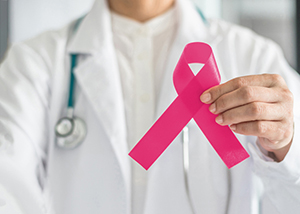In a study reported in The Lancet, the Collaborative Group on Hormonal Factors in Breast Cancer found that the use of menopausal hormone therapy is associated with an increased risk of breast cancer, with risk increasing as the duration of use increases, in both current and past users.
Study Details
The study was an individual participant meta-analysis of eligible prospective studies identified through systematic searches of formal and informal sources for published and unpublished studies, with searches being conducted regularly from January 1992 through January 2018. Data from current menopausal hormone therapy users were included up to 5 years (mean = 1.4 years) after last reported use. Logistic regression analysis was used to determine adjusted risk ratios (RRs) for breast cancer among particular groups of menopausal hormone therapy users vs never users.

Photo credit: Getty
Key Findings
During follow-up, 108,647 postmenopausal women developed breast cancer at a mean age of 65 years; of these, 55,575 (51%) had used menopausal hormone therapy. Among women with complete data available, mean menopausal hormone therapy duration was 10 years among current users and 7 years in past users, and mean age was 50 years at menopause and 50 years at the start of menopausal hormone therapy.
Every menopausal hormone therapy type, except vaginal estrogens, was associated with excess breast cancer risk. Risk ratios were consistently higher for estrogen/progestogen vs estrogen-only menopausal hormone therapy; were higher in current vs past users; and increased steadily with duration of use in both current and past users.
Significant excess risk was observed even during years 1 to 4 of current use, with risk ratios of 1.60 (95% confidence interval [CI] = 1.52–1.69) for estrogen/progestogen menopausal hormone therapy and 1.17 (95% CI = 1.10–1.26) for estrogen-only menopausal hormone therapy. For years 5 to 14 of current use, risk ratios were 2.08 (95% CI = 2.02–2.15) for estrogen/progestogen menopausal hormone therapy and 1.33 (95% CI = 1.28–1.37) for estrogen-only menopausal hormone therapy.
Risk associated with estrogen/progestogen use during years 5–14 were greater with daily vs less frequent progestogen use, with risk ratios of 2.30 (95% CI = 2.21–2.40) vs 1.93 (95% CI = 1.84–2.01; heterogeneity P < .0001).
“If these associations are largely causal, then for women of average weight in developed countries, 5 years of menopausal hormone therapy, starting at age 50 years, would increase breast cancer incidence at ages 50 to 69 years by about 1 in every 50 users of estrogen plus daily progestogen preparations; 1 in every 70 users of estrogen plus intermittent progestogen preparations; and 1 in every 200 users of estrogen-only preparations.”— Collaborative Group on Hormonal Factors in Breast Cancer
Tweet this quote
For a given menopausal hormone therapy preparation, risk ratios during years 5 to 14 of current use were much higher for estrogen receptor–positive vs estrogen receptor–negative tumors.
Risk ratios were similar for women starting menopausal hormone therapy at 40 to 44, 45 to 49, 50 to 54, and 55 to 59 years old; risk was attenuated in women starting menopausal hormone therapy after age 60 years and by adiposity, with little risk being observed among obese women receiving estrogen-only menopausal hormone therapy.
In past users, risk ratios were often not significant with shorter durations of menopausal hormone therapy use, irrespective of time since last use. For example, risk ratios were not significantly elevated among past users of estrogen/progestogen for less than 1 year or among users of estrogen-only for 4 years or less, irrespective of time since last use. However, some excess duration-dependent risk persisted for 10 years or more after stopping menopausal hormone therapy. For example, risk ratios were significant among both estrogen/progestogen and estrogen-only past users at ≥ 10 years since past use for those who used menopausal hormone therapy for 5 to 9 years (RRs = 1.19 and 1.14) and ≥ 10 years (RRs = 1.28 and 1.29).
The investigators concluded, “If these associations are largely causal, then for women of average weight in developed countries, 5 years of menopausal hormone therapy, starting at age 50 years, would increase breast cancer incidence at ages 50 to 69 years by about 1 in every 50 users of estrogen plus daily progestogen preparations; 1 in every 70 users of estrogen plus intermittent progestogen preparations; and 1 in every 200 users of estrogen-only preparations. The corresponding excesses from 10 years of menopausal hormone therapy would be about twice as great.”
Disclosure: The study was funded by Cancer Research UK and the Medical Research Council. For full disclosures of the study authors, visit thelancet.com.

